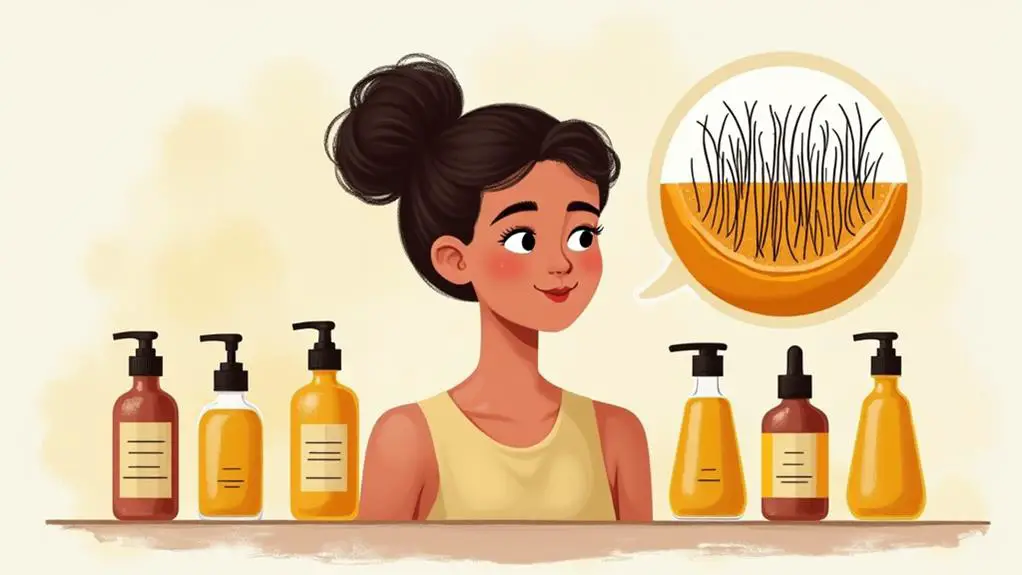When you're dealing with low porosity hair, finding the right oils can make all the difference. You're likely tired of products just sitting on your hair's surface, rather than truly penetrating to provide nourishment. Fortunately, there are some oils that are specifically suited to help low porosity hair thrive. Jojoba, argan, and grapeseed oils, for instance, have unique properties that allow them to deeply moisturize and protect your hair. But that's just the beginning – there are other oils that can offer additional benefits, from protein repair to softening and nourishing your locks.
Key Takeaways
- Jojoba oil is easily absorbed into low porosity hair, providing moisture and balancing pH levels for optimal hydration.
- Grapeseed oil is lightweight and non-greasy, making it ideal for daily styling and perfect for low porosity hair that struggles to absorb moisture.
- Argan oil deeply nourishes and moisturizes hair ends, creating a protective barrier that shields hair from further dryness and brittleness.
- Avocado oil repairs and restores damaged hair cuticles, improving hair elasticity and providing intense hydration to dry and brittle hair.
- Coconut oil repairs and rebuilds damaged hair structures with its rich source of protein, strengthening hair follicles and promoting hair growth.
Jojoba Oil for Moisturizing Benefits
When dealing with low porosity hair, you're likely no stranger to dryness and brittleness. This is because your hair's cuticle layer is compact, making it challenging for moisture to penetrate.
Jojoba oil can be a game-changer in this scenario. With its lightweight, non-greasy texture, jojoba oil is easily absorbed into your hair, providing much-needed moisture. Its molecular structure is similar to your hair's natural oils, allowing for seamless oil penetration and absorption.
This results in hydrated, soft, and supple strands that are less prone to breakage. As jojoba oil deeply nourishes your hair, it also helps to balance your hair's pH levels, further enhancing its ability to absorb moisture.
Coconut Oil for Protein Repair
While jojoba oil excels at providing moisturizing benefits, low porosity hair often requires an additional layer of repair to combat damage and breakage. This is where coconut oil comes in, offering protein treatment benefits that help strengthen your hair. As a rich source of protein, coconut oil helps repair and rebuild damaged hair structures, promoting hair growth and reducing breakage.
Coconut oil's protein-rich properties make it an ideal hair strengthening method. When used as a pre-shampoo treatment, coconut oil helps:
| Benefits | Effects |
|---|---|
| Repairs damaged hair | Strengthens hair follicles |
| Reduces breakage | Promotes hair growth |
| Nourishes hair cuticles | Enhances hair elasticity |
Argan Oil for Hydration Boost
When you use argan oil on your low porosity hair, you'll notice it moisturizes dry ends and nourishes damaged strands, providing an intense hydration boost.
Argan oil's unique composition allows it to lock in moisture, creating a protective barrier that shields your hair from further dryness.
Moisturizing Dry Ends
You're likely no stranger to the frustrating phenomenon of dry, brittle ends that seem to sap the life out of your locks.
This common issue in low porosity hair can be addressed with the right oils and techniques.
When it comes to dry ends treatment, argan oil is an excellent choice. Rich in antioxidants and fatty acids, argan oil deeply nourishes and moisturizes your hair, particularly at the ends where it's most prone to dryness.
To maximize its benefits, try end repair methods like applying a generous amount of argan oil to the ends of your hair, then covering it with a shower cap and leaving it on for at least an hour.
You can also mix argan oil with other oils like coconut or olive oil for added moisture.
Regularly incorporating argan oil into your hair care routine can help lock in moisture, reduce breakage, and leave your hair looking healthy and vibrant.
Nourishing Damaged Strands
Damaged strands can be a persistent problem for low porosity hair, leading to a fragile, rough texture that's prone to breakage.
As you work to repair and restore your hair, using nourishing oils in your routine is crucial. Argan oil, in particular, provides a hydration boost that can help to revitalize damaged hair.
Imagine your hair as:
- A delicate fabric, worn thin by constant manipulation and styling
- A brittle branch, prone to snapping under the slightest pressure
- A parched landscape, cracked and dry from lack of moisture
To combat these issues, you can use argan oil as a damaged hair mask or incorporate it into your hair repair treatments.
Rich in antioxidants and essential fatty acids, argan oil deeply nourishes and moisturizes your hair, helping to repair and restore its natural strength and vitality.
Locking in Moisture
Because low porosity hair tends to repel moisture, it's vital to use argan oil strategically to lock in hydration and prevent it from escaping.
You can achieve this by applying argan oil to your hair immediately after washing, when your hair is still damp. This allows the oil to penetrate deeper into your hair shaft, enhancing moisture retention.
Another effective moisture retention method is to use argan oil as a pre-shampoo treatment. Apply a generous amount of argan oil to your hair an hour before washing, and then shampoo as usual. This helps to lock in moisture and protect your hair from humidity.
Speaking of humidity, controlling it's essential for low porosity hair. To do this, you can use a humidity-control spray or serum that contains argan oil. These products help to smooth the hair cuticle, reducing frizz and flyaways, while also locking in moisture.
Olive Oil for Nourishing Locks
- Imagine your hair drinking in the oil's nourishing properties, like a parched plant soaking up water.
- Picture the oil's antioxidants and fatty acids working to repair and protect your hair's cuticles, leaving it soft and supple.
- Envision your hair's natural shine and essentialness restored, as the olive oil's moisturizing benefits bring it back to life.
Olive oil's benefits extend beyond hydration.
It also helps to lock in moisture, reduce frizz, and add shine to your hair.
Avocado Oil for Softening Strands
When you use avocado oil on your low porosity hair, you'll notice it effectively nourishes dry ends, hydrating them to prevent breakage.
Additionally, avocado oil's moisturizing properties help hydrate hair cuticles, leaving your locks feeling silky and supple.
Nourishing Dry Ends
You've probably noticed that the ends of your low porosity hair tend to be the driest and most prone to breakage.
This is because the cuticles are compact and resistant to moisture, making it challenging for hydrating products to penetrate. As a result, your hair's natural elasticity is compromised, leading to brittle ends that are prone to splitting and breaking.
To combat this, you'll need a dry ends treatment that can help restore hair elasticity. Avocado oil is an excellent option for this purpose. Rich in nutrients and antioxidants, it deeply nourishes and moisturizes your hair, helping to repair and restore its natural elasticity.
- Hydrates and softens: Avocado oil deeply moisturizes your hair, leaving it feeling soft, supple, and manageable.
- Repairs and restores: The nutrients in avocado oil help repair damaged hair cuticles, restoring your hair's natural elasticity and shine.
- Protects from further damage: Avocado oil creates a protective barrier around your hair, shielding it from environmental stressors and further damage.
Hydrating Hair Cuticles
With low porosity hair, compact cuticles can prevent moisture from penetrating the hair shaft, leading to dryness and brittleness. To combat this, you need an oil that can effectively hydrate your hair cuticles, allowing for better moisture absorption and improved hair elasticity. Avocado oil is an excellent choice for cuticle repair, as it contains nutrients that help to soften and nourish your hair strands.
| Benefits | Effects on Low Porosity Hair |
|---|---|
| Cuticle repair | Allows for better moisture absorption, reducing dryness and brittleness |
| Hair elasticity improvement | Enhances hair's ability to stretch without breaking, reducing breakage |
| Moisturizing properties | Hydrates hair cuticles, leaving your hair feeling soft and supple |
Smoothening Frizzy Textures
Frizzy textures can be a persistent problem for individuals with low porosity hair, making it difficult to achieve a smooth, silky finish.
You've likely experienced the frustration of spending hours styling your hair, only to have it frizz up as soon as you step out the door.
Avocado oil can be a game-changer in this department, serving as a powerful frizz fighter that helps to smoothen and soften your strands.
When used regularly, avocado oil can:
- Leave your hair feeling velvety soft to the touch
- Add shine and luster to dull, lackluster locks
- Create a barrier against humidity, preventing frizz and flyaways
Grapeseed Oil for Lightweight Care
Grapeseed oil is an ideal choice for low porosity hair care when a lightweight touch is necessary.
You'll find it particularly beneficial when your hair needs gentle nourishment without weighing it down. This oil's lightweight nature allows for easy oil absorption, which is vital for low porosity hair that often struggles to absorb moisture.
Grapeseed oil's hair benefits extend to its ability to moisturize and soften your hair without clogging the cuticles.
It's rich in antioxidants and polyunsaturated fatty acids, which help to lock in moisture and protect your hair from environmental stressors. As a result, your hair becomes more manageable, with reduced frizz and a healthier appearance.
When using grapeseed oil, you can expect improved hair elasticity and a more vibrant shine.
It's also an excellent choice for daily styling, as it won't leave a greasy residue or weigh your hair down. Overall, grapeseed oil is an excellent addition to your low porosity hair care routine, providing the perfect balance of nourishment and lightweight care.
Frequently Asked Questions
Can I Use Multiple Oils for Low Porosity Hair at the Same Time?
You can create a customized blend for low porosity hair by combining oils using oil blending and mixology methods, but be cautious not to overdo it, as too many oils can exacerbate the issue, so start with a few and adjust as needed.
How Often Should I Oil My Low Porosity Hair for Best Results?
When caring for low porosity hair, you'll find that frequency matters; oiling too frequently can lead to build-up, while infrequent application hinders moisture retention. Aim for a balance, considering your hair's oil absorption rate, to achieve ideal hydration and nourishment.
Can Low Porosity Hair Be Permanently Damaged by Using Wrong Oils?
You risk permanent damage if you use wrong oils, as they can clog your hair's pores, leading to oil buildup and pore suffocation, which can cause irreparable harm, especially if left untreated for an extended period.
Are All Hair Oils Suitable for Low Porosity Hair in Humid Climates?
In the steamy veil of humid climates, you'll find that not all oils are created equal; some become oil penetration blockers, exacerbating low porosity hair woes, so it's vital to choose oils that harmonize with your hair's unique needs.
Can I Use Hair Oils on Low Porosity Hair That's Already Damaged?
When dealing with damaged strands, you'll want to avoid oil overload, which can exacerbate low porosity hair issues. Instead, use lightweight, easily absorbed oils in moderation, focusing on hydration and gentle nourishment to repair and protect your fragile locks.
Conclusion
As you navigate the world of oils for low porosity hair, remember that each one is like a specialized tool in your hair care toolbox. Jojoba, argan, and grapeseed oils are the trio that'll help you build a strong foundation, providing hydration, nourishment, and protection. Think of it like constructing a house – you need the right materials to create a sturdy structure that can weather any storm. With these oils, you'll be well on your way to building healthy, vibrant locks that shine from the inside out.














